English:After splitting up with Alice and John, Ana and I decided to make it, slowly but surely, to the Nepalese border of the State of Uttarakhand in India, west of the country. We were also very tired since the arrival of the monsoon in Dharamshala, the home of the Dalai Lama and thousands of Tibetan refugees in India. We spent 3 days there, a little more than expected, and the area was far too touristy for my taste and less authentic than the Ladakh and its Tibetan Buddhism. In addition, we were not able to truly enjoy the place because of the monsoon that came in too early this year. With John and Alice, we tried to elaborate a plot to interview the Dalai Lama, but he unfortunately was in Australia at that time! We had to travel with our clothes in plastic bags because we thought it would be a good idea to finally wash them, when we saw the washing machine, where we were staying on the hills above Dharamshala. After 7 months without seeing a washing machine, I might have got too much enthusiastic. The weather was so rainy, and it was so humid, that beyond the fact of never drying out, my clothes got mouldy and I almost threw them away. I finally could dry them out in Rishikesh, a few days later, thanks to the unexpected presence of a fan in the room of our new guesthouse. We arrived in Rishikesh on June 24 after another tumultuous night of transiting on a local bus. One needs to know what it is to travel by local bus in India to truly understand the level of exhaustion that can be easily accumulated. So, knowing that I hadn’t not fully recovered from the long trek in the Himalayas, I got sick. Indeed, for the first time in fifteen years, I had stomach and digestion issues, along with a high fever that kept me in bed for two days. The most surprising thing in all this is that more than never being really sick, I had not had stomach problems throughout the journey, even after drinking tap water and eat street food in Iran, and also after arriving in India, compared to 90% of the other foreigners travelling in these areas. I suspected it was a direct result from the nutritional deficiency accumulated during the trek...and of course also from the heavy tiredness accumulated in previous weeks. I don’t want to worry anyone because ultimately I feel much better by now and I even gained some weight, but it is important for me to also share this kinds of events with the people who follow me because it is part of the hazards of the journey and perhaps more particularly of the way I travel. No, everything is not going smoothly every single day and if I just shared the "positive" events with you, it would not be honest regarding the approach and the perception that you can have of what I do. Moreover, it is nothing "negative" to me, it is just part of the whole experience. It's all about interpretation. When you create an imbalance within you, whether it is physical, physiological, emotional or spiritual, your body reminds you of your rights and duties as to stay in balance with yourself. His only way to communicate with you is to make you feel certain things, and when you can not readjust this imbalance for some reason, you get sick. It seems obvious to me that at that time, the part or system of your body that falls ill is the one that is the most fragile. This is why I believe in the power and the cause and effect of the psychosomatic equilibrium. The key is to understand why and how, without necessarily overanalyzing things. Just a thought... There is, of course, always more to tell than the few lines of my occasional publications on my blog, whether it relates to chronological, emotional, philosophical or even spiritual events, and even though it may already seem too much for some, there will be more details for those who will honour me to read the book that I'm writing, whether it will be published one day or not. So we stayed four days in Rishikesh, on a hill away from the noise and air pollution of the city centre. The place and the guesthouse were very peaceful, although my disease and the monsoon has not allowed me to fully enjoy them. In fact, I mentioned that the monsoon was much earlier than expected this year and in fact, there was severe floods a few kilometres upstream on the Ganges, because the locals was neither informed nor prepared for the occasion . Rishikesh is located on the Mystic River, about 200 miles from its source, and the place is famous for its baths in the "sacred" Indian giant, and its mouth, more than 2000 km further on runs from Calcutta to Bangladesh, on more than 800km wide. It is not less than 10 000 people who have drowned and whose bodies were dumped into the sacred waters. Without cynicism, I was also in awe in front of the beauty of the river in spate and the power and majesty of its currents. It really is a place that I loved and where amazing energies are really involved, even though I was somewhere touched by the unfortunate events caused by the elements. At that moment, I could not help but think of a "butterfly effect" of the fact that winter in Europe has also been found to be very unusual this year. As soon as I felt better, we decided to leave and go as quickly as possible to Nepal as the place began to smell of death. Everything around was getting rotted and even vegetables began to darken because of the huge humidity rate, not to mention epidemics beginning to spread out...so it was time to head off. However, we first had to solve a small detail which was that Ana’s Indian visa expired three days earlier! Without going into the details of the causal relationship of this problem, and while some might think that this is really "idiotic", I would say that this was inappropriate, but we had to react positively to the problem anyway. Finally, after a long reflection, we decided to get to the border anyway, thinking that Ana would just have to pay a fine. After we arrived at the Nepalese border, and especially after another 14-hour journey by night bus in miserable conditions, to cover the 200 kilometres separating us from Nepal, the Immigration Service kindly told us they could absolutely do nothing for us and to go back to Delhi...! It was really hard to accept, especially since we arrived on site in a condition of extreme tiredness and were just 400m from a country where I was longing to visit since the very origin of my journey around the world overland. However, one hour later, we enrolled in another 10 hour ride on a local bus to reach the Indian capital city that I had no desire to see again, after more than a month spent in the tranquillity and greenery of the Himalayan peaks. We strongly hoped to arrive before the closing of the immigration service in the afternoon, which of course never happened, and as it was a Friday, we were somewhat obliged to spend the weekend there. As it was too "easy" for us, it also became clear that we could not stay in a hostel because of the expiry of Ana‘s visa, due to local foreign policy, and instead of sleeping in the street, which was really close to happening, I was "lucky" enough to have a friend there, David, who accepted us at his and his roommates’ place that weekend, which saved us the day…and the weekend. We also were "lucky" that his roommates were not there and therefore to be able to occupy one of the free rooms. David had come back in the morning from a bike ride in Ladakh, and had been there with Fabien, one of my best friends’ brother in France, whom I did not suspect the presence at that time, which was brilliant news! When I think that some people still believe in coincidences... In any cases, all these "coincidences" that we had had, induced a much more pleasant weekend than expected, something that was beyond my expectations. In fact, I had absolutely no expectation apart from the fact that I wanted to leave Delhi as soon as possible and to head back to the Nepalese border, but in the meantime, it was very nice to see familiar faces. After 4 days in Delhi, having sorted out the administrative problems of the visa and another delicious 10 hour ride in the night bus, we were reaching the border again and this time, we especially made it through...it was July 3. We decided to take a one-month visa and would see where the wind would take us in a not too distant future. When arriving in Nepal, I immediately felt that the energies were really different and besides, after 10 days of illness and still losing weight, I was finally cured. It's been 10 years that I have not taken "western" medication and I noticed that the healing time is often the same, without intoxicating myself with antibiotics or other rubbish, which are poison anyway. Moreover, this is mostly a lobby or the pharmaceutical industry, which needs us sick in order to make profit. I rely on my essential oils and aromatherapy, which is perfectly fine to me. After 10 hours of transit to the border, we made the effort to commute another 100km...and 7 hours by bus in order to chill out a few days in the jungle of Bardia National Park, south west of the country. The stay in the jungle was interesting but still very wet! The atmosphere was just so unbearable with the high humidity, and the daily concert of thousands of species of insects and other creepy crawlies in front of the windows of the hut did not necessarily induce a nice sleep. We strolled around the place and discovered a park in which the elephants were chained to satisfy the local tourism business and for the pleasure of unaware tourists. I was shocked by the scene. Most elephants stay all their lives to satisfy the tourists that get back home, proud to have ridden an elephant in Nepal. This is ridiculous and it is time for the human species to evolve a bit. It made me think of the concept of a zoo, when I realise that these days, people still think that a zoo is made to protect and preserve animals. No, zoos were created by a species that is more greedy and selfish than the other ones, namely the human species, that chase animals away from their natural habitat, and for the purpose of generating a profit, zoos have emerged. Of course, the point to create them in order to satisfy the public opinion, when people have began to feel guilty, is only sand thrown in people‘s eyes. Our next step was Lumbini, the birthplace of Prince Siddhartha, who became enlightened and was thus renamed Buddha, approximately 2600 years ago. I was very excited to have the privilege of going there as for over 10 years I've always felt close to Tibetan Buddhism in terms of philosophy and values of life, and therefore it was a very special moment for me. It is always interesting to visit these strongholds of religions, seven if I do not adhere to the business that has emerged from them, it helps one understand why the world and our species evolved the way it does. The trip was a little more enjoyable because the atmosphere was less humid than in the jungle and I could therefore sleep better at night. Thereafter we went to Pokhara, located in the geographic centre of the country at the foothills of the Annapurna mountain range. Due to the context and circumstances of the journey, it was more or less decided that this city and its beautiful lake would be where we would stay a little longer in order to get into the process of looking for a job. Finally, we’ve been there for a fortnight, and after 21 days and more than 100 hours of transiting by local bus, with a few sleepless nights on the way, it was time to get some rest! Meanwhile, the monsoon had also proved to be a key element in the dynamic of handling my time and travel. We considered to hitchhike several times but it was just impossible, or I would have probably thrown my guitar to the garbage after a week. Trekking in the Annapurna was also impossible, but I had taken advantage of the Himalayas in India, a few weeks ago. Besides, I had to wait 12 days in order to finally see the magnificent silhouette of Mount Machhapuchhare, 6993m high,and the 8091m of the mystical Annapurna. I was thrilled to see my first peak of over 8000m, which, in addition, was coated in the colours of a delectable sunset. Although this is obviously not the right time to visit Asia at the moment, Nepal is a beautiful country and the locals are even more friendly than in India. Moreover, it is possible that some people, who come here directly and by plane, get into a culture shock but for me, after having spent six months in India, I think that the two countries are closely linked. I would say that Nepal is a logical continuation of the Indian subcontinent; The topology is very similar to Northern India, the same subtropical forest, the same mountain range, the same food, the same clothes and almost the same language. What is more, the face features are very similar, even if the eyes tend to gently stretch and narrow, this is also the case in the north of India. The only difference that is truly significant is the fact that Nepal does not have major cities except Kathmandu in terms of Indian standards. Therefore, the place looks much greener, relaxing and less polluted. When reaching Pokhara, it was the first time since I left Nice, 10 months ago, that I could give myself a break for such a « long » time, especially with a reliable internet connection. Therefore, I was particularly focused on finding a English teaching position in Asia. I slowly but surely crept through a forest of different factors to take into account relating to geography, practical concerns, or to the position itself. Finally, after one more opportunity to Myanmar, I will work in China for the next academic year. I’ll very soon be in Kathmandu in order to visit the Chinese Embassy and get more information. As I already explained in my previous publication, the plans were originally not what they are now but as I have so often mentioned, there really is no "plans" when you travel independently for an indefinite period of time and that is something which is somehow really appreciable. Everything is impermanent and it is the only thing that we must learn to accept. It is a great exercise to develop our natural ability to adapt and to accept...after all, all of my journey is based on these principles; The ability to change my life dramatically, being in harmony with myand beliefs, and to feel free among other citizens of the world who see things in the same way in order to move towards a world and a society which should be more in line with its natural environment and with people truly communicating with each other. Otherwise, the possibility of connecting to the Internet has also led to a stay in Pokhara based on more intellectuality. I've always been a big fan of documentaries, which have often supplemented my readings throughout my eternal quest for understanding the world and its origins. For this purpose, it is always interesting to know yourself, through the experience of life in itself. There is no special method for this, or let's say that there are an infinite number of them. It is up to each and every of us to find out one that suits us and generally, when you truly comprehend and integrate the principle of letting go of things, everything comes to you naturally, without necessarily having to really "look for." It is, I think, also important to understand what are our origins, in order to perceive what could be the evolution of our species in a near future, in order to get prepared for it. Knowing that we have reached a turning point in our evolution, namely the one of a species that is about to destroy its own planet, I thus think that it would be interesting to start looking at possible outcomes and at the choices we can do to contribute individually and collectively to shift the societal paradigm, which is happening NOW. For my part, I have always been fascinated by our origins and somewhat I have never believed in History as described in our school books. For once, I will not refer to the obsolete contemporary history of most of the events in the 20th and 21st centuries, or to the permanent lie in which we have lived since the creation of the U.S. Federal Reserve Bank in 1913. I speak here of a challenging and total redefinition of the evolutionary theory of our origins as most archaeologists and historians describe it. I never believed in the fact that we were just a primitive species barely able to hunt, fish and pick fruits, and almost overnight, if we look at History, we invented mathematical knowledge and built monuments with incredible accuracy such as the Pyramids of Giza, of which we could hardly move one of the monoliths with current cranes and technology. Lately I've felt privileged to see one of the most exciting documentaries that I had the opportunity to watch in many years, directed by Graham Hancock, which is popular on TV channels such as National Geographic or Discovery Channel. He is, to me, one of the greatest explorers in modern history. I'm a big fan. If you get the chance to master the language of Shakespeare, and if you like the mysteries of our origins, it would be simply a blasphemy not to watch this documentary! It is called "Quest for the lost civilization" and you can easily find it on Youtube. I'll let you know very soon my landing place in Asia, sometime in August. For those who live in the northern hemisphere, enjoy the summer! Cheers, Nicolas "We all have, originally, the same potential to understand things. The only difference between people is their ability to involve themselves in the process of figuring things out, and the fact of not considering this as what should be a priority for everyone. " N.G. Français:Après s’être séparés avec Alice et John, Ana et moi décidâmes de nous rendre, doucement mais surement, vers la frontière Népalaise de l’Etat de l’Uttarakhand en Inde, à l’ouest du pays.
Nous étions aussi pas mal à l’ouest, mais au sens figuré, depuis l’arrivée de la mousson sur Dharamshala, la terre d’adoption du Dalai Lama et de milliers de réfugiés tibétains. Nous sommes restés 3 jours sur place, un peu plus que prévu, et l’ensemble s’est avéré beaucoup trop touristique à mon goût et beaucoup moins authentique que le Ladakh et son bouddhisme tibétain. De plus, nous n’avons pas pu profiter pleinement de l’endroit à cause d’une mousson beaucoup trop précoce aux yeux de tout le monde. Avec John et Alice, nous avons tout de même monté une combine pour essayer d’interviewer le Dalai Lama, mais il s’est avéré être en Australie à ce moment là! Nous avons du voyager avec nos affaires trempées dans des sacs en plastique car nous avions pensé que ce serait une bonne idée de les laver, quand nous avons vu la machine à laver…en plastique de l‘endroit où nous restions dans les hauteurs de Dharamshala, pour ma part la première depuis l’Iran, six mois plus tôt. Il a tellement plu de manière constante et forte, et il faisait tellement humide, qu’au-delà du fait de ne jamais sécher, mes vêtements sentaient le moisi et j’ai failli les jeter à la poubelle. Je suis arrivé à mes fins à Rishikesh, quelques jours plus tard, grâce à la présence inopinée d’un ventilateur dans la chambre de notre nouvelle guesthouse. Nous sommes arrivés sur Rishikesh le 24 Juin après une nouvelle nuit tumultueuse de transit en bus. Il faut vraiment savoir ce que c’est de voyager en bus local en Inde pour comprendre le niveau d’exténuation qui peut y être facilement accumulé. Du coup, sachant que je n’avais pas complètement récupérer du long trek dans l’Himalaya, je suis tombé malade. En effet, pour la première fois depuis quinze ans, j’ai eu des problèmes d’estomac et de digestion, couronnés par une fièvre monstre qui m’a cloué au lit pendant 2 jours. Le plus surprenant dans tout cela, c’est qu’en plus de n’être jamais vraiment malade, je n’avais pas eu de problème d’estomac pendant tout le périple, même à boire l’eau du robinet et manger de la nourriture dans la rue en Iran, et surtout en arrivant en Inde, en comparaison à 90% des étrangers qui arrivent sur place. J’ai soupçonné le fait que ceci soit une conséquence directe de la carence nutritionnelle accumulée pendant le trek…et bien évidemment de la lourde fatigue également accumulée les semaines précédentes. Je ne veux bien entendu inquiéter personne, car au bout du compte tout va pour le mieux à présent et j‘ai même repris un peu de poids, mais il est important pour moi de partager ce genre d’évènements avec les gens qui me suivent, car cela fait également partie intégrante des aléas du voyage et peut être encore plus particulièrement de la façon dont je voyage. Non, tout n’est pas rose et si je ne partageais que les évènements « positifs » avec vous, cela ne serait pas honnête par rapport à l’approche et la perception que vous pouvez avoir de ce que je fais. D’ailleurs, cela n’a rien de « négatif » à mes yeux, et fais juste partie de l’expérience dans son ensemble. Tout est question d’interprétation. Quand vous créez un déséquilibre en vous, qu’il soit physique, physiologique, émotionnel ou spirituel, votre corps vous rappelle vos droits et vos devoirs quant au fait de rester en équilibre avec vous-même. Sa seule manière de pouvoir communiquer avec vous est de vous faire ressentir certaines choses, et quand vous ne pouvez pas remédier à ce déséquilibre, vous tombez malade. Il me parait évident qu’à ce moment là, la partie de votre corps qui tombe malade, et cela vaut aussi pour les blessures, est celle qui est le plus fragile. C’est la raison pour laquelle je crois autant au pouvoir et à la relation de cause à effet du psychosomatique. Le tout est de comprendre le pourquoi du comment, sans forcément analyser les choses à outrance. A méditer… Il y a bien sur toujours beaucoup plus à raconter que les quelques lignes de mes publications ponctuelles de mon blog, que ce soit d’un point de vue événementiel, émotionnel, philosophique ou même spirituel, et même si cela pourrait déjà paraitre beaucoup trop pour certains, il y aura bien plus de détails pour celles et ceux qui me feront l’honneur de lire les recueils que je suis en train d’écrire, qu’ils soient publiés un jour ou pas. Nous sommes donc restés 4 jours sur Rishikesh, sur une colline à distance de la pollution sonore et atmosphérique du centre ville. L’endroit et la guesthouse furent très paisibles, même si encore une fois, la maladie et la mousson ne m’ont pas permis d’en profiter pleinement. D’ailleurs, je mentionnais que la mousson était beaucoup plus précoce que prévue cette année et en effet, il y a eu de graves inondations quelques kilomètres en amont sur le Gange, car les locaux n’étais ni avertis, ni préparés pour l’occasion. Rishikesh est située sur le fleuve mystique, à environ 200 kilomètres de sa source, et le lieu est réputé pour ses bains dans l’eau « sacrée » du géant indien, dont l’embouchure, plus de 2000 km plus loin, s’étend de Calcutta jusqu’au Bangladesh, sur plus de 800km de large. Dans un autre registre de baignade, ce ne sont pas moins de 10000 personnes qui ont péri noyées et dont les cadavres se sont déversés dans les flots sacrés. Sans aucun cynisme, je fut d’ailleurs en admiration devant la beauté du fleuve en crue et la puissance et majestuosité de ses courants. C’est vraiment un endroit que j’ai beaucoup aimé et où les énergies sont vraiment prenantes, même si j’étais quelque part touché par les évènements malheureux causés par les éléments. A cet instant, je n’ai pas pu m’empêcher de penser à un « effet papillon » quant au fait que l’hiver en Europe s’est avéré être également très atypique cette année. Dès que je me suis senti mieux, nous avons décidé de partir et de nous rendre le plus vite possible vers le Népal, car l’endroit commençait à sentir la mort. Tout pourrissait aux alentours et même les légumes commençaient à noircir à cause de l‘énorme humidité ambiante, sans parler des épidémies qui commençaient à proliférer…il était vraiment tant de partir. Cependant, nous devions tout d’abord régler un petit détail, le fait que le visa indien d’Ana ait expiré 3 jours plus tôt! Sans rentrer dans les détails de la relation causale de ce problème, et même si certains pourraient penser que cela est vraiment « idiot », je dirais plutôt que ceci fut inopportun, mais il fallait réagir positivement au problème quoi qu’il en soit. Finalement, après une longue réflexion, nous décidâmes de tout de même nous rendre à la frontière, en pensant qu’Ana aurait juste à payer une amende. Après que nous soyons arrivés à la frontière népalaise, et après surtout un nouveau trajet de 14 heures en bus, de nuit et dans des conditions misérables, pour couvrir les 200 kilomètres nous séparant du Népal, le service de l’immigration nous a gentiment dit qu’il ne pouvait absolument faire pour nous et de retourner sur…Delhi! Ce fut vraiment dur à accepter, surtout que nous étions arrivés sur place dans un état lamentable et étions juste à 400m d’un pays où je me tardais d’être depuis l’origine même de la conception de mon périple autour du monde par voie terrestre. Cependant, 1 heure plus tard, nous étions repartis pour 10 nouvelles heures de bus local en direction de la capitale indienne que je n’avais aucune envie de retrouver, après plus d’un mois passé dans la tranquillité et la verdure des sommets himalayens. Nous espérions vivement arriver avant la fermeture des bureaux du service de l’immigration dans l’après midi, ce qui bien sur n’arriva jamais, et comme nous étions un vendredi, nous fûmes obligés de passer le weekend sur place. Comme cela était bien trop « facile » pour nous, il s’avéra aussi que nous ne pouvions pas rester dans une auberge de jeunesse à cause de l’expiration du visa d’Ana, ceci étant du à la politique locale, et au lieu de dormir dans la rue, ce qui fut vraiment proche d‘arriver, j’ai eu la « chance » d’avoir un ami sur place, David, qui a accepté le fait que je reste chez lui et ses collocs ce weekend là, ce qui nous sauva la mise. Nous fûmes aussi « chanceux » que ses collocs ne soient pas là et de pouvoir ainsi occuper l’une des chambres. David était rentré le matin même d’une virée en moto dans le Ladakh, et s’était rendu sur place avec Fabien, le frère de l’un de mes meilleurs amis en France, dont je ne soupçonnais pas la présence à ce moment là et qui fut une nouvelle bien agréable à découvrir! Quand je pense que certaines personnes croient toujours aux coïncidences… En tout cas, toutes ces « coïncidences » ont fait que nous avons passé un weekend bien plus plaisant que prévu, chose qui était au-delà de mes espérances. En fait, je n’avais absolument aucune espérance à part le fait de vouloir quitter Delhi aussi vite que possible et retourner ainsi vers la frontière népalaise, mais entre temps, ce fut très agréable de retrouver des visages familiers. Après 4 jours sur Delhi, avoir régler les problèmes administratifs du visa et 10 nouvelles délicieuses heures en bus nocturne, nous nous sommes retrouvés à nouveau à la frontière et cette fois ci, nous pouvions surtout la traverser sans encombre…ce fut un 3 Juillet. Nous décidâmes de prendre un visa d’un mois et verrions bien où le vent nous mènerait par la suite. En arrivant au Népal, j’ai senti tout de suite que les énergies était vraiment différentes et d’ailleurs, après 10 jours de maladie et encore avoir perdu du poids, j’étais finalement guéri, comme par miracle. Cela fait 10 ans que je n’ai pas pris de médication « occidentale », et j’ai pu remarquer que le temps de guérison est bien souvent le même, sans pour autant s’intoxiquer avec des antibiotiques ou autres, qui sont un poison en soi. De plus, ceci alimente surtout les caisses de l’industrie pharmaceutique, qui a besoin de nous malades pour survivre. Je me cantonne à mes huiles essentielles et à l’aromathérapie et c’est très bien comme ça. Après les 10 heures de transit vers la frontière, nous avons fait l’effort de faire 100km…et 7 heures de bus en plus pour nous isoler quelques jours dans la jungle du Bardia National Park, au sud ouest du pays, dans le but de nous reposer et déconnecter un peu. Le séjour dans la jungle fut intéressant mais toujours aussi pluvieux! L’atmosphère était juste irrespirable tellement le taux d’humidité était élevé, et le concert quotidien des milliers d’espèces d’insectes et autres rampants devant la fenêtres de la hutte n’ont pas forcément induit un sommeil propice. Nous nous sommes baladés dans les environs, le temps de découvrir un parc dans le lequel les éléphants y étaient enchaînés pour le business touristique local et le plaisir de touristes inavertis. J’ai été outré par la scène. La plupart des éléphants y restent toute leur vie pour satisfaire les touristes qui rentrent chez eux, fiers d’avoir chevaucher un éléphant au Népal. C’est ridicule et il serait temps que l’espèce humaine évolue un peu. Cela m’a fait penser au concept d’un zoo, quand je réalise qu’à notre époque, des gens pensent encore qu’un zoo est fait pour protéger et préserver les animaux. Non, les zoos ont été créés car une espèce plus avare et égoïste que les autres, l’espèce humaine, à chasser les animaux de leur habitat naturel et que dans un nouveau but de générer un profit de masse, les zoos ont vu le jour. Bien entendu, le fait de les créer dans le but de satisfaire l’opinion publique, quand les gens ont commencé à se sentir coupables, n’est que de la poudre jetée aux yeux. Notre prochaine étape était Lumbini, le lieu de naissance de Prince Siddhârta, qui devint illuminé et ainsi rebaptisé Bouddha, il y a environ 2600 ans. J’étais très excité d’avoir le privilège de me rendre sur place, comme cela avait était le cas pour le Ladakh en Inde. Cela fait plus de 10 ans que je me suis toujours senti proche du Bouddhisme tibétain en termes de philosophie de vie, et cela était donc un moment très spécial pour moi. Il est également toujours intéressant de visiter ces places fortes des religions car même si je n’adhère pas au business qui s’y relate, cela permet de mieux comprendre pourquoi le monde et notre espèce ont évolué ainsi. Le séjour fut un peu plus agréable car l’atmosphère y était moins humide que dans la jungle et je pouvais, de ce fait, mieux dormir la nuit. Par la suite, nous nous sommes rendus sur Pokhara, située au centre géographique du pays, au pied de la chaîne de l’Annapurna. De par le contexte et les circonstances de voyage, il était plus ou moins décidé que la ville et son joli lac seraient l’endroit où je resterais un peu plus de temps pour pouvoir me lancer dans la démarche de rechercher un travail. Finalement, cela fait maintenant quinze jours que nous y sommes, et après 21 jours et plus de 100 heures de transit en bus local, tout ceci agrémenté de quelques nuits blanches au passage, il était temps de se reposer un peu! Entre temps, la mousson s’est également avérée être encore une fois un élément déterminant dans la dynamique du moment et ainsi du voyage. Nous avons bien pensé à faire du stop plusieurs fois mais cela fut absolument impossible, ou alors j’aurais surement jeté ma guitare au bout d’une semaine. Le trekking dans l’Annapurna fut également impossible, même si j’avais déjà bien profité de l’Himalaya en Inde, quelques semaines auparavant. D’ailleurs, j’ai du attendre 12 jours pour pouvoir finalement apercevoir la silhouette magnifique des 6993m du Mont Machhapuchhare et les mystiques 8091m de l’Annapurna, dont toute la chaine de montagnes adjacente porte le nom. J’étais aux anges de voir mon premier sommet de plus de 8000m, qui était enrobé qui plus est, des couleurs d’un coucher de soleil délectable. Même si de manière évidente, ce n’est pas la bonne période pour visiter l’Asie en ce moment, le Népal est un pays magnifique et les locaux y sont encore plus accueillants qu’en Inde. D’ailleurs, il est possible que certaines personnes qui viennent ici directement et par avion reçoivent un choc culturel important mais pour ma part, après avoir passé 6 mois en Inde, je pense que les 2 pays sont très liés. Je dirais que le Népal est une continuité logique du sous continent indien; La topologie est très similaire au nord de l’Inde, la même forêt subtropicale, la même chaine de montagne, la même nourriture, les mêmes vêtements et presque le même langage. De plus, même les visages sont similaires, et même si les yeux ont tendance à doucement s’étirer et devenir plus étroits, c’est également le cas dans le nord de l’Inde. La seule différence, qui est vraiment appréciable, est le fait que le Népal ne possède pas de villes majeures à l’exception de Kathmandu, en termes de standards indiens. De ce fait, l’endroit parait beaucoup plus vert, reposant et moins pollué. En arrivant sur Pokhara, ce fut la première fois depuis que je suis parti de Nice, il y a 10 mois, que je me pose autant de temps, et surtout avec une connexion internet fiable. De ce fait, je me suis particulièrement concentré sur la recherche d’un poste de professeur d’anglais en Asie. Je me suis doucement mais surement faufilé au travers d’une foret de différents paramètres à prendre en compte, que ce soit au niveau géographique, pratique, ou du poste en soi. Finalement, après plusieurs possibilité dont une au Myanmar, je devrais travailler en Chine pour la prochaine année académique. Je me rends très prochainement sur Kathmandu pour visiter l’ambassade chinoise et obtenir plus d’informations. Comme je l’ai déjà expliqué dans ma publication précédente, les plans n’étaient pas ceux-ci à la base mais comme je l’ai aussi souvent mentionné, il n’existe pas vraiment de « plans » quand on voyage de manière libre et indépendante pour une durée indéterminée et c’est quelque chose de vraiment appréciable. Après tout, c’est là que ce situe toute la magie d’être parti sans argent dans cette aventure de faire un tour du monde par voie terrestre et maritime. Tout est impermanent et il s’agit de la seule chose qu’il faut apprendre à accepter. Cela est un excellent exercice naturel pour développer ses facultés d’adaptation et de remise en question…et après tout, l’ensemble de mon périple est basé sur ces principes; La possibilité de pouvoir changer de vie radicalement, en étant en harmonie avec ses valeurs et convictions, et de se sentir libre parmi d’autres citoyens du monde qui voient les choses de la même façon, dans le but d’évoluer vers un monde et une société plus en adéquation avec son environnement naturel. Sinon, la possibilité de connexion à internet a également engendré un séjour à Pokhara axé sur l’intellectualité. J’ai toujours été un grand fan de documentaires, qui viennent souvent compléter mes lectures dans ma quête éternelle de la compréhension du monde et de ses origines. Pour cela, il est toujours intéressant de se connaitre soi même, au travers de l’expérience de la vie en soi. Il n’existe pas de méthode spéciale pour cela, ou disons plutôt qu’il en existe une infinité. C’est à chacun d’entre nous de trouver celle qui nous convient et généralement, quand on comprend le principe de se laisser aller aux choses, tout vient à nous naturellement, sans avoir nécessairement besoin de réellement « chercher ». Il est, je pense, également important de comprendre qu’elle est notre origine, pour mieux percevoir qu’elle pourrait être l’évolution de notre espèce dans un futur proche, pour pouvoir s’y préparer. Sachant que nous sommes arrivés à un point de retour de notre évolution, à savoir celui d’une espèce qui est sur le point de détruire sa propre planète, et je pense qu’il serait intéressant de commencer à s’intéresser aux issues possibles et aux choix que nous pouvons faire pour contribuer individuellement et collectivement au changement de paradigme sociétal qui est déjà en train de s’effectuer. Pour ma part, j’ai toujours été fasciné par notre origine et quelque part, je n’ai jamais cru à l’Histoire telle qu’elle est décrite dans nos bouquins d’école. Pour une fois, je ne ferai pas référence à l’histoire contemporaine obsolète de la plupart des évènements des 20ème et 21ème siècles, ou au mensonge permanent dans le lequel nous vivons depuis la création de la banque fédérale américaine en 1913. Je vous parle ici d’une remise en question totale de la théorie évolutionniste de notre origine comme la plupart des archéologues et des historiens la définissent. Je n’ai jamais cru au fait que nous étions juste une espèce primitive tout juste capable de chasser et pêcher, et que presque du jour au lendemain, si l’on se réfère à l’Histoire, nous avons inventé les mathématiques et construit des monuments d’une précision incroyable comme les pyramides de Gizeh, dont nous pourrions à peine déplacer les monolithes avec la technologie actuelle. Dernièrement, j’ai donc eu la « chance » de voir l’un des documentaires les plus passionnants que j’ai eu l’occasion de voir ces dernières années, réalisé par Graham Hancock, qui est populaire sur des chaines TV comme National Geographic ou Discovery Channel. L’un des plus grands explorateurs de l’histoire moderne à mes yeux. Je suis un grand fan. Si vous avez la chance de maitriser la langue de Shakespeare, et si vous aimez les mystères de nos origines, ce serait tout simplement un blasphème de ne pas visionner ce documentaire! Il se nomme « Quest for the lost civilization » et vous pouvais le trouver sur Youtube. Je vous tiendrai au courant très prochainement de mon point de chute en Asie au mois d’Aout. Pour ceux qui vivent dans l’hémisphère nord, profitez bien de votre été! A bientôt, Nicolas « Nous avons tous, à la base, les mêmes potentialités pour comprendre les choses. La seule différence qui sépare les individus est leur capacité d’investissement personnelle dans la démarche de comprendre les choses, et dans le fait de pas considérer ceci comme ce qui devrait être une priorité pour tout le monde. » N.G.
0 Comments
Your comment will be posted after it is approved.
Leave a Reply. |
Nicolas GennaJourney around the world overland since 2012. Categories
All
|
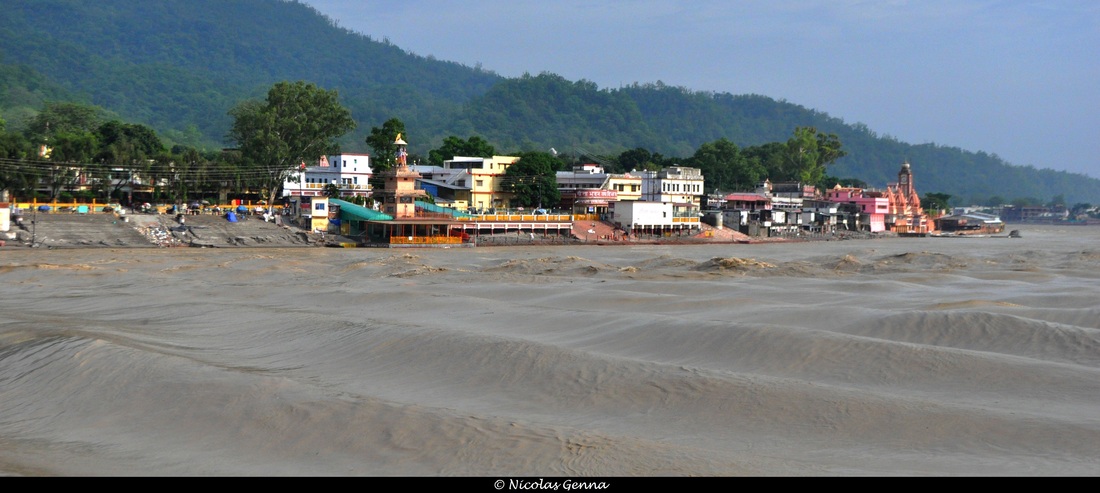
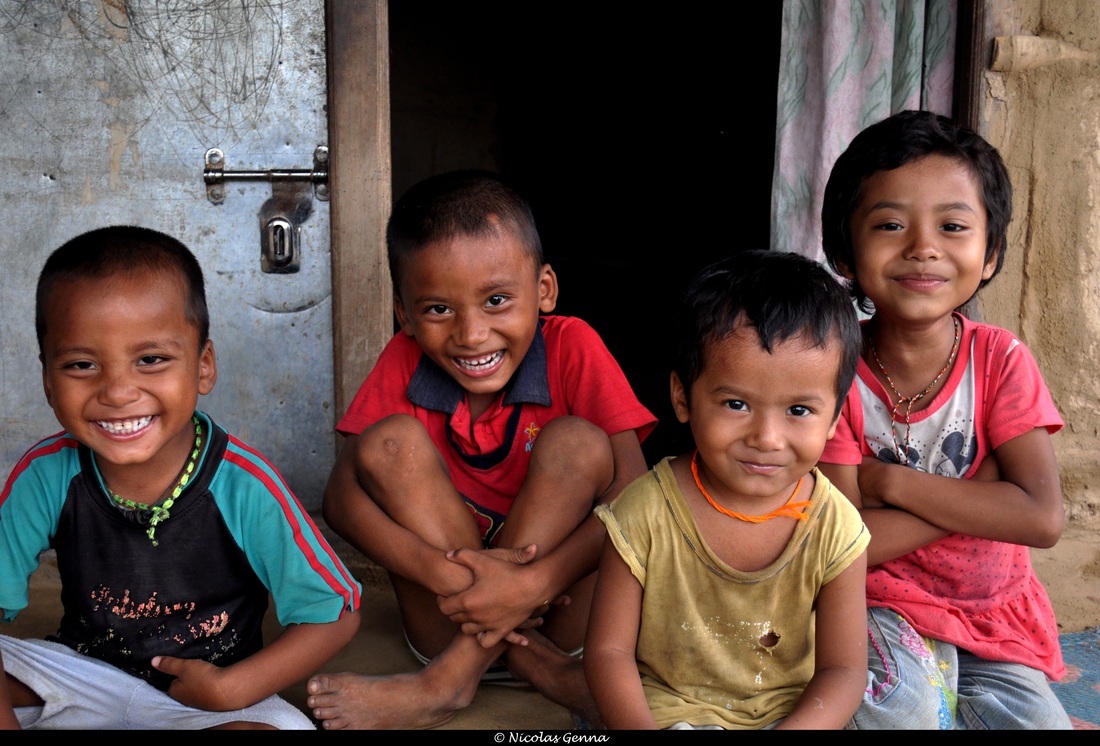
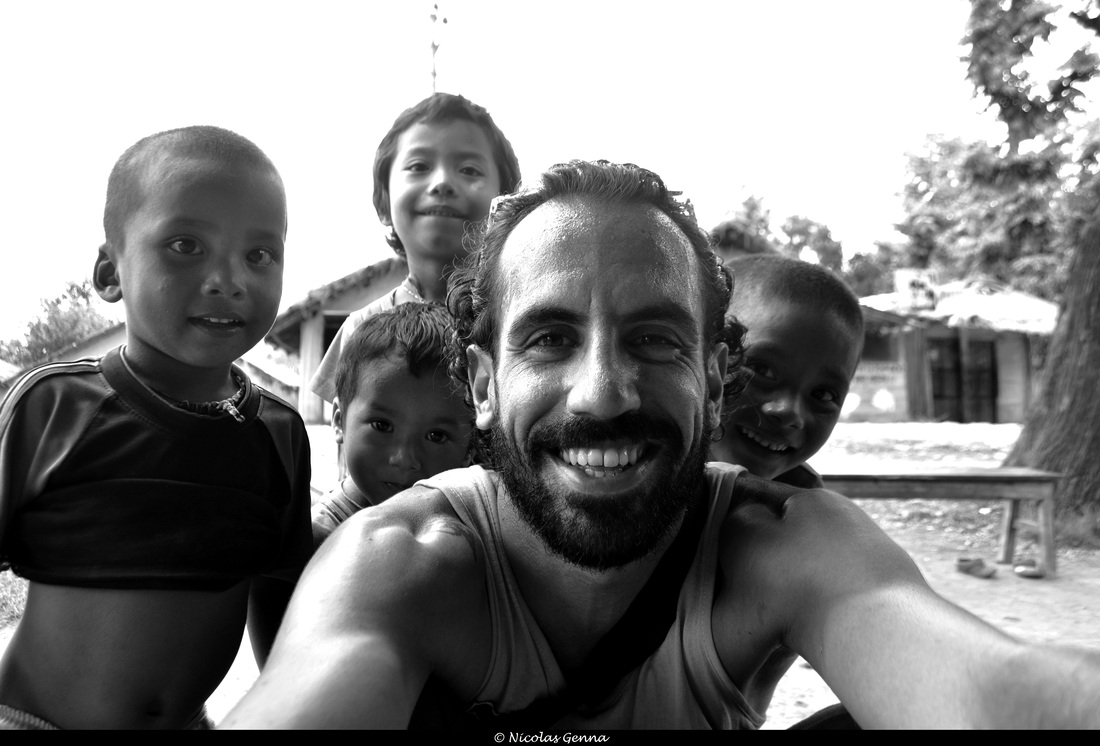
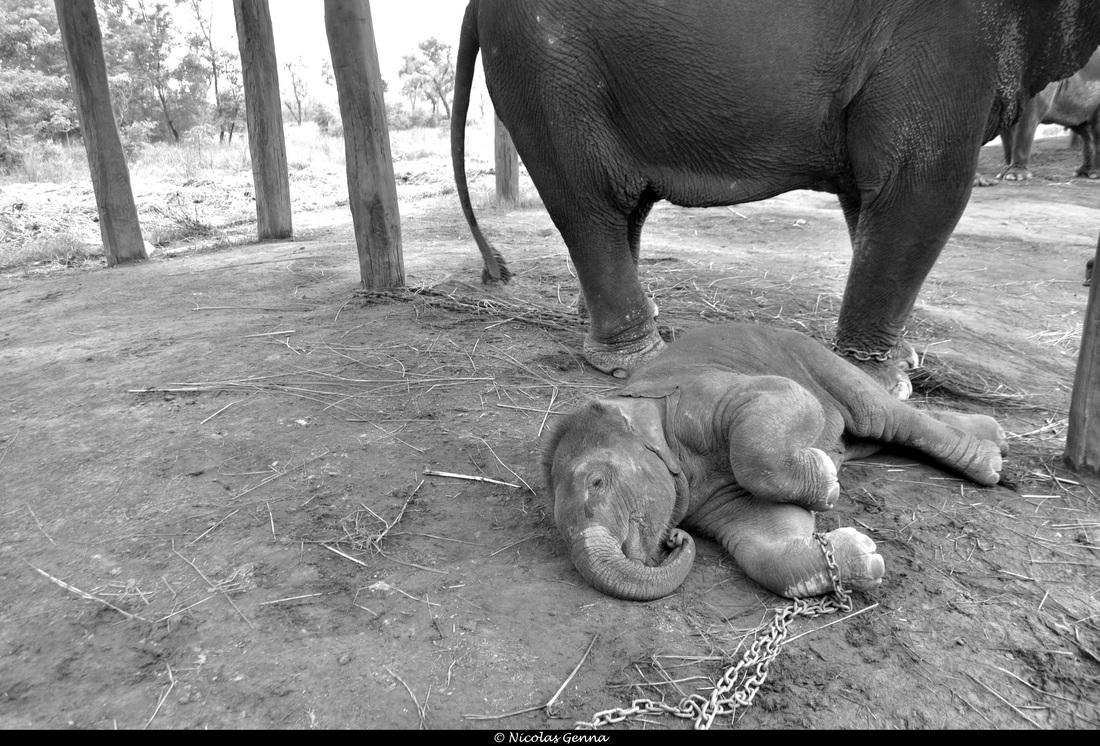
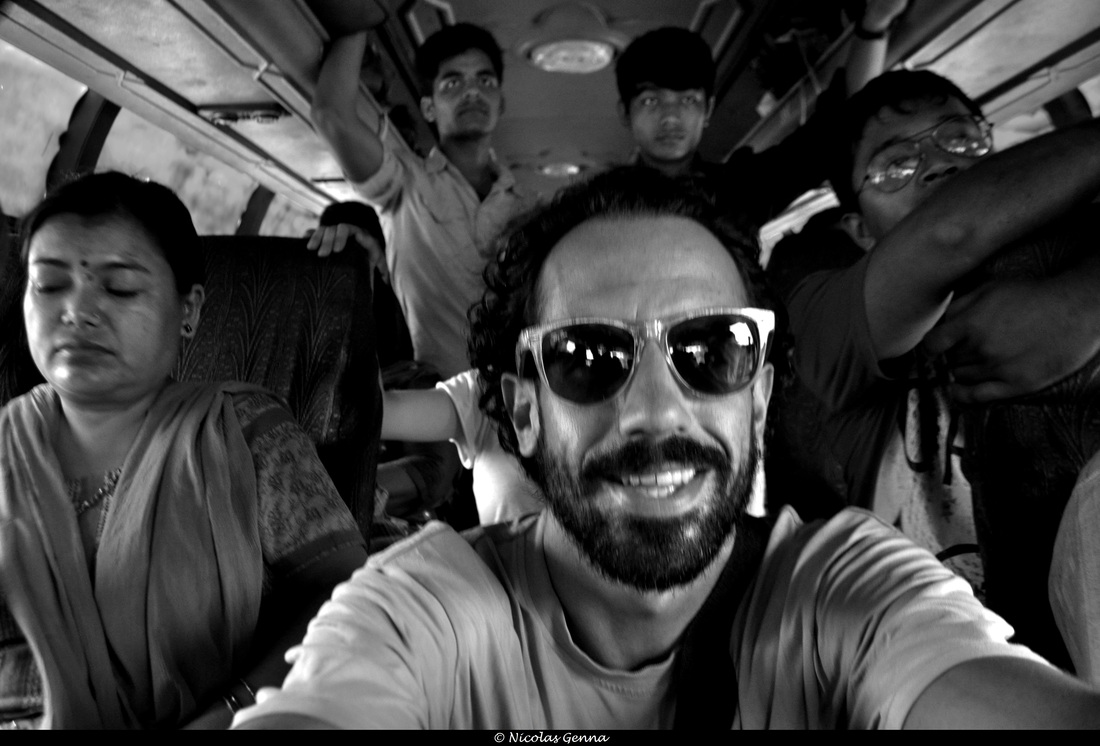
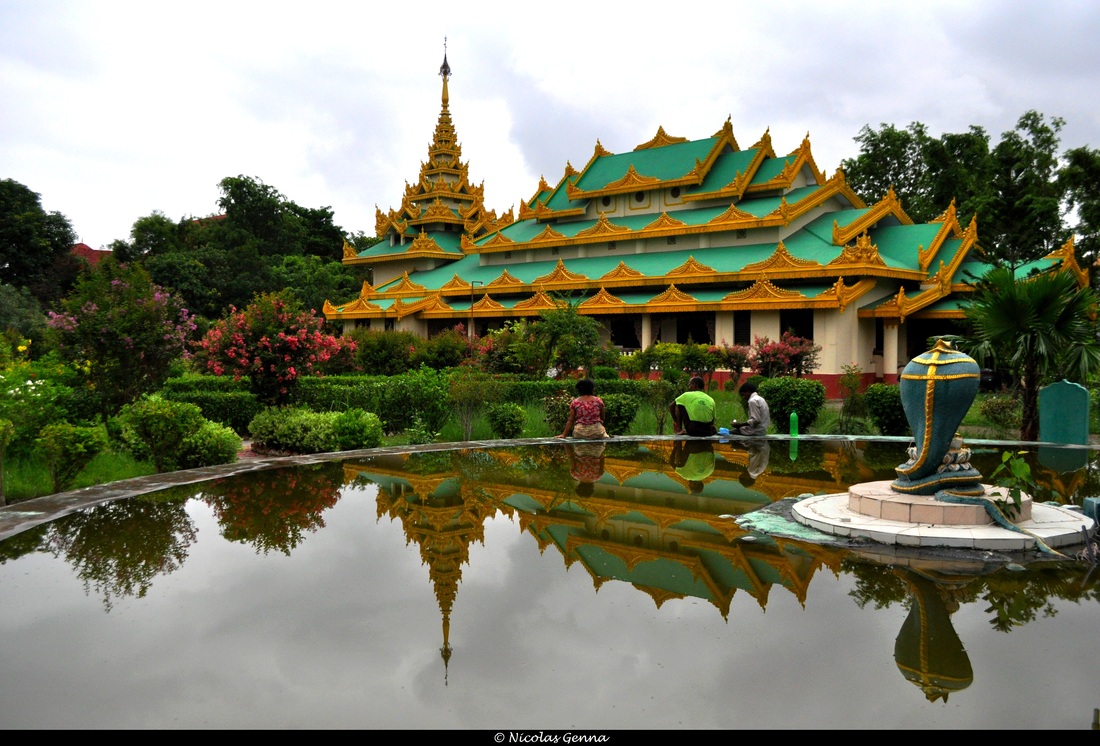
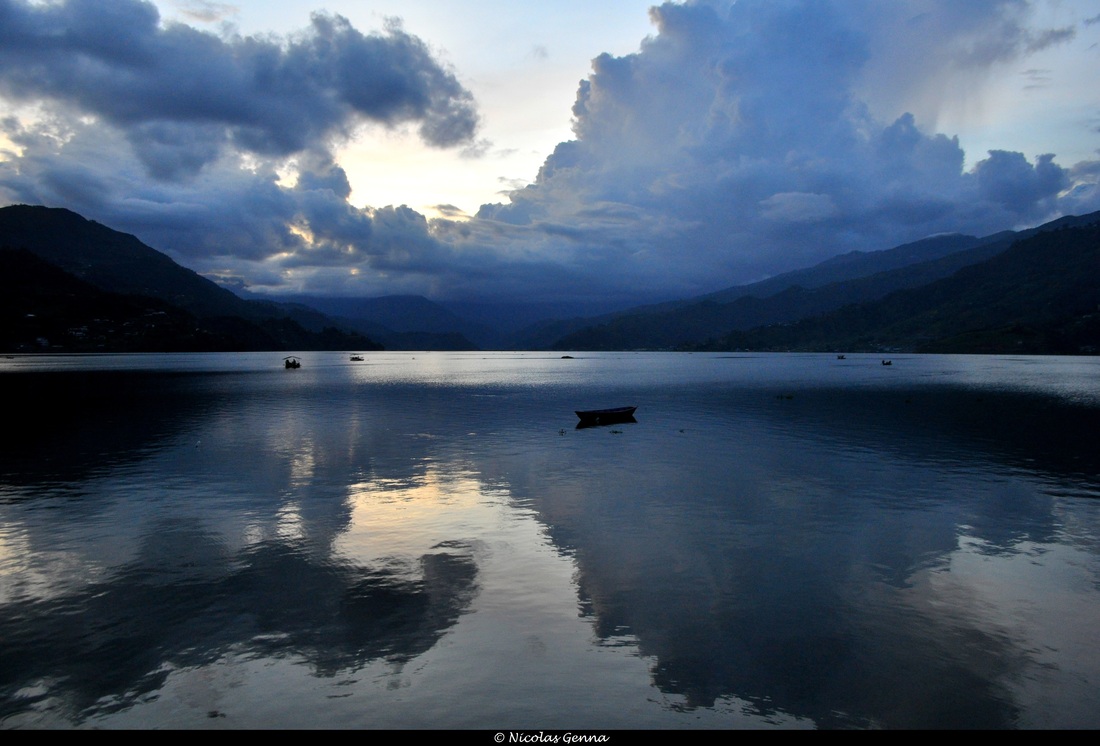
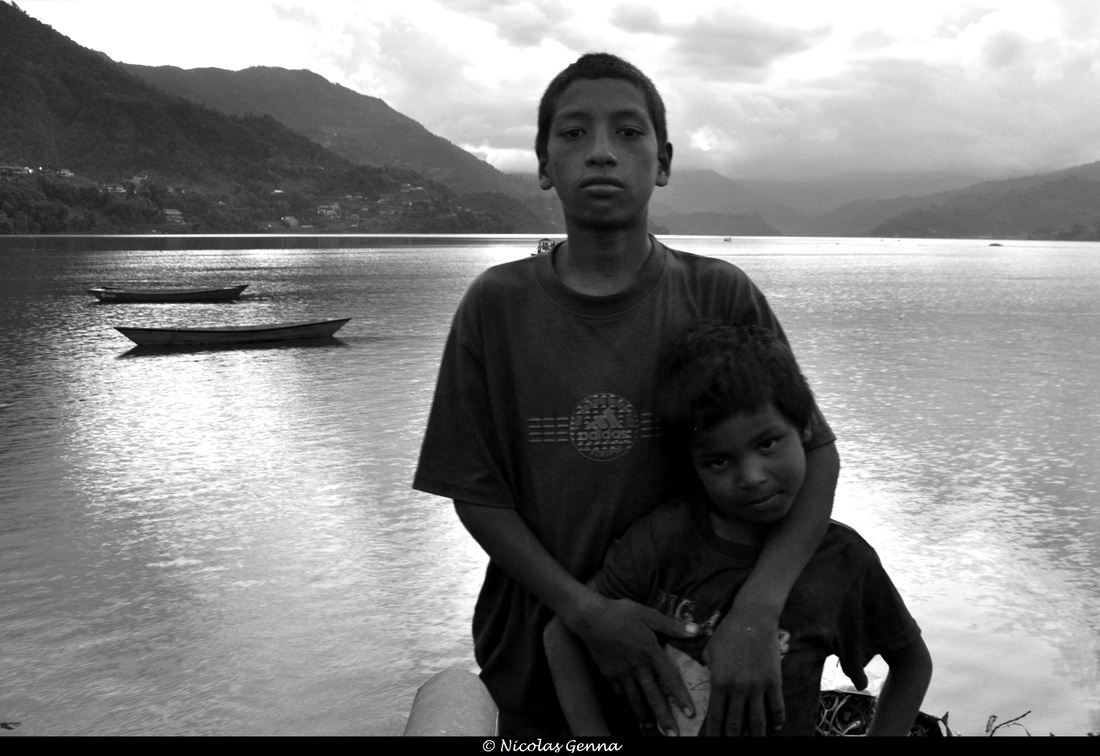
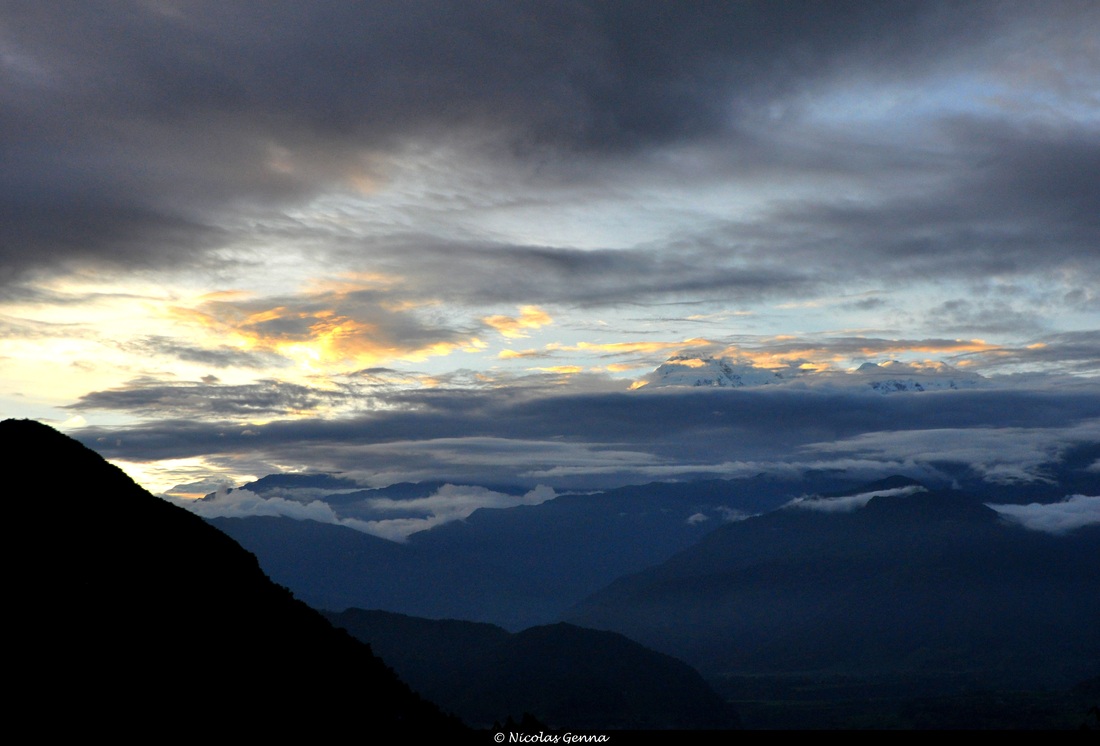
 RSS Feed
RSS Feed
